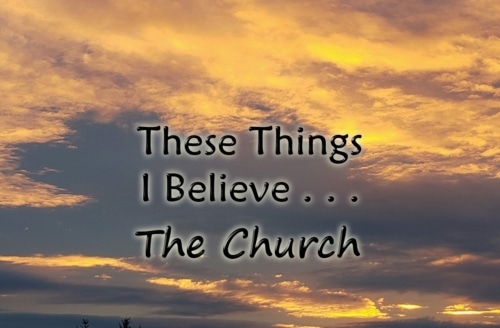This brief article describes what I believe about the Church. For a more in-depth look see The Doctrine of the Church.
The Nature of the Church
- I believe that the Church is God’s primary purpose in creation; that God has made all that is in order to produce the Church. The Church is the assembly of called-out ones. Those God has called out of this world to be in a relationship with himself. At some time in the future, this creation will pass from existence; but the Church will remain.
- I believe that the Church is, metaphorically, the body of Christ (1 Cor 12:27). Christ is the head of the body (Eph 1:22-23), giving life and direction to it. As his body we represent him in this world, carrying on his ministry from his time here, and following his direction. Each believer is a part of the body (1 Cor 12:13, 27). And each is essential for a healthy and fully functioning Church (Eph 4:16).
- I believe Christ’s Church is one body and that we are called to have one heart, one mind, and one spirit (John 17:20-23; Phil 2:1-4). While local churches have a variety of traditions and some variation in doctrine, we are all part of one body. It is important that local churches work together as much as possible without compromising doctrinal integrity (2 Cor 8:1-7).
The Work of the Church
- I believe that the Church is responsible for carrying out the Great Commission (Matt 28:18-20) and the Great Commandments (Mark 12:28-31). The Great Commission instructs us to evangelize the world and to teach those who respond how to live as disciples of Christ. The Great Commandments instruct us first to love God, which we demonstrate in our worship, and then to love each other, building one another up in Christ.
- I do believe that the Church is made up of all believers across time and space. This universal Church also includes those from the Old Testament who obeyed the law as an act of faith (Rom 4:16). It also includes those since the time of Christ who have put their faith in him.
The Organization of the Church
- I believe that the universal Church is represented here on earth whenever believers assemble together to worship, serve God, and fellowship together. These local churches may be informal or well organized, but whatever form they take they are representing Christ’s one Church. Within these local churches there may be found some who have membership in the local church who are not believers and are not included in the universal Church (Matt 7:21-23).
- I do not believe that there is a specific form of church government that is mandated in the Scriptures or that would work best for every local church. I do believe that if Christ is not the head of the local church, then it does not really matter what form of government they use. If Christ is the head, then I believe he will lead a church to develop an organizational structure that will best suit their needs. I do believe that a body of elders has the most support of Scripture (1 Tim 5:17), but that could well be because that is what was common at the time.
Church Ordinances
- I believe that the Scripture teaches that baptism should be one of the initial steps a believer takes; out of obedience to Christ and to identify with him. I do believe that baptism is a symbolic act that mirrors the death and resurrection of Christ and that pictures the spiritual transformation that has occurred in our own lives (Rom 6:1-4). Baptism is best represented by immersion and is only applicable to believers.
- I believe that the Lord’s Supper is the second ordinance given to the church. The Lord’s Supper is a proclamation of Christ’s death until he returns (1 Cor 11:22-26). The elements themselves represent the body and blood of Christ, but in no way is he actually present in the elements. I believe that the Lord’s Supper should only be shared with other believers.

